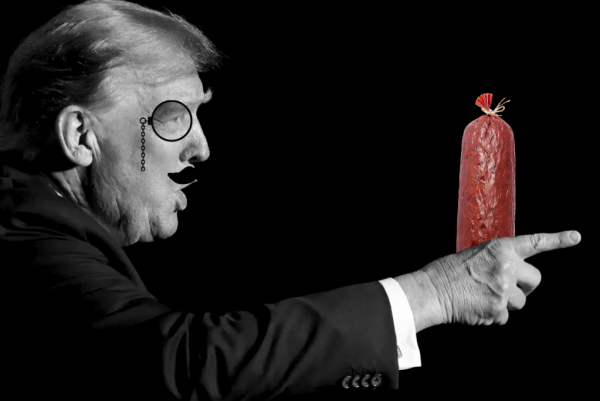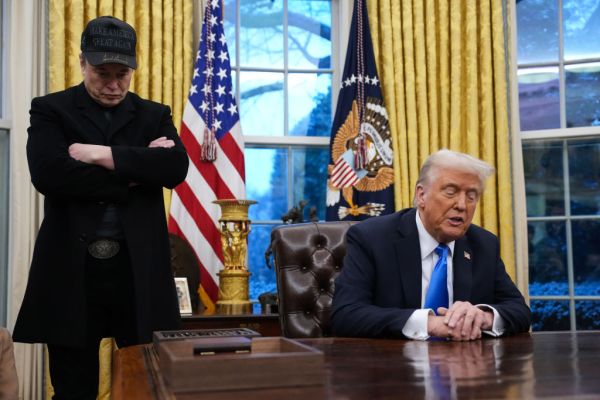The thing about Donald Trump is, he’s Donald Trump.
Briefly set aside any old-fashioned moral considerations about Donald Trump’s low personal character—as a purely analytical matter, that low character is the most direct and comprehensive way to understand what it is the administration is actually doing. That “character is destiny” is a political truism, but it is even more true in the case of Trump than in the case of most politicians, because Trump, being overburdened with an excess of self, has no political interests or values independent of his self-interest, which should be understood in terms that are only partly financial and in the main psychological. Whether as a politician or a peddler of knockoff watches, Donald Trump’s business is being Donald Trump.
The notion that Trump is some kind of master negotiator is one of the silliest aspects of the Trump cult. He is something closer to the opposite of a dealmaker: Trump is an old-fashioned bully—and one can write that in a way that is merely descriptive rather than pejorative—in the sense that his capacity for action is limited to those points where there is the least resistance. What that means practically is that in domestic affairs, he prefers to act administratively, through executive action rather than in actually negotiating with Congress, which is to say, by commanding subordinates who cannot negotiate with him rather than dealing with legislators who can negotiate, even when that way of doing things limits and hinders his agenda. Internationally, it means that Trump will hector and humiliate relatively weak and friendly countries (Canada) or countries that are in distress and in need of American assistance (Ukraine) while accommodating (in deed and rhetorically) powerful enemies such as Russia and China. A bully acts where he has maximum power over his target. That isn’t a brilliant negotiating strategy—it ensures that you get your way only in those matters in which it is easy to get your way.
Much has been made of the botched diplomacy of the secretary of defense, Pete Hegseth, who preemptively conceded to Moscow the bulk of its demands vis-à-vis Ukraine (Ukrainian territory, Ukrainian exclusion from NATO) without even trying to get anything in return. The Hegseth lesson: Hire a cable-news pundit, and he’s going to do cable-news punditry.
The J.D. Vance lesson is: Hire a troll, and he’s going to troll. And Vance’s trolling has been in some ways more of an error than Hegseth’s kowtowing. The vice president lectures the Europeans about the need for them to “step up” in Ukraine, and then the administration begins a “negotiation” process with Moscow that excludes not only the Ukrainians—who might have views about how their country is to be parceled out—but also our European allies. It is one thing to talk about the Europeans as though they were irrelevant or to treat them that way—but it is an entirely different thing to do so while making them central to your plans for a Ukrainian security settlement—and saying so. The European way of asserting power is not Trump’s swaggering, muscle-flexing style—it is passive-aggressive. It is not very difficult to get the Europeans to agree to do hard and expensive things—it is very difficult to get them to follow through. The Europeans have veto power over a critical element of the Trump administration’s plans for Ukraine (their necessarily large contribution to security arrangements) and the administration has just emphasized for them how useful that veto power can be—while giving them reason to be more inclined to use it rather than less inclined.
To run roughshod over Canada or Denmark—or the European allies we need for the Ukrainian-led security presence in Ukraine the Trump administration says it wants—is to misunderstand the relevant power calculus. Yes, Canada and Denmark are relatively small and weak compared to the United States. So are most of our European allies. Washington doesn’t need the Europeans to be powerful in comparison to the United States; Washington needs the Europeans to be powerful in comparison to Russia, Iran, and China. And, though we sometimes forget the fact, they are: While the European military capacity is nothing like the American one, it is more than a match for anything Russia or Iran could muster presently; while the European economic capacity is less than the American one (EU GDP will be a little more than $20 trillion this year as compared to $28 trillion for the United States) it is a bit more than the Chinese one (probably a hair under $19 trillion) and is bolstered by critical competencies in manufacturing and sophisticated industrial production. (It is true that there are no Internet-oriented European firms to compare to our American giants, and that illustrates a real failure of the European model; but, in the event of a catastrophic war, what would you rather have: factories building diesel and aviation engines or ... Facebook?) Allies are tools, means to practical ends—and intelligent leaders know how to use them as such. Trump and Vance are engaged in grandstanding as a form of therapy for themselves and their social media audiences.
Another way of explaining all this is that Trump does what he does because of who he is and not in pursuit of a coherent policy agenda. As William Hague wrote in the Times of London: “[H]is version of bringing peace to Ukraine really does involve calling an aggressive dictator for a long chat, cutting out the leader of the country under attack, making concessions in advance of negotiations and completely ignoring the allies who have spent the past three years acting in concert with the US.” Why? For the same reason the first Trump administration never saw him negotiating a durable immigration-reform package or doing more with trade than tinkering around at the edges of NAFTA. Immigration, trade, and crime are the issues in which Trump has long evinced the most interest, and he did almost nothing on any of these. (Violent crime rates were higher on the day Joe Biden beat Trump than on the day Trump took office in 2017, but the change was not dramatic and does not seem to have been driven by federal policy.) And that was Trump’s low character at work: his personal cowardice, his laziness, his refusal to apply himself to anything hard in a consistent and sustained way. But he’ll order people to call the Gulf of Mexico the “Gulf of America,” because that doesn’t take any work or a difficult negotiation.
With Trump’s character as a north star, one can get a good idea—with some confidence but by no means with certainty—about what to expect of his second term. Among other things: His strategy for Ukraine will consist of having the occasional telephone call with Vladimir Putin and then tweeting about how wonderful the telephone call was, and Elon Musk et al. will continue their Kulturkampf against the bureaucracy while watching helplessly—and making lame excuses—as spending and the national debt continue to increase rather than decrease or even stabilize. Action on trade and immigration will largely be limited to areas in which the president has some plausible power to act unilaterally, and his strategy for adapting when the courts step in to enforce constitutional limits on executive powers will be to whine about the judges and then do, effectively, nothing. Much of the political action will consist of the use and abuse of executive discretion (pardons of violent criminals, quashing corruption cases against political allies, handing out favors to favor-seeking business interests, etc.) rather than changing the laws or enacting broad structural reforms in federal programs. On tricky issues such as health care, it’ll be another four years of “a concept of a plan” that spends four years being three weeks away from completion.
In an earlier era, Moscow’s apologists and admirers liked to pose as hard-headed realists and declared: “You have to break a few eggs to make an omelet.” George Orwell considered this and asked: “Where’s the omelet?”
Well?







Please note that we at The Dispatch hold ourselves, our work, and our commenters to a higher standard than other places on the internet. We welcome comments that foster genuine debate or discussion—including comments critical of us or our work—but responses that include ad hominem attacks on fellow Dispatch members or are intended to stoke fear and anger may be moderated.
With your membership, you only have the ability to comment on The Morning Dispatch articles. Consider upgrading to join the conversation everywhere.